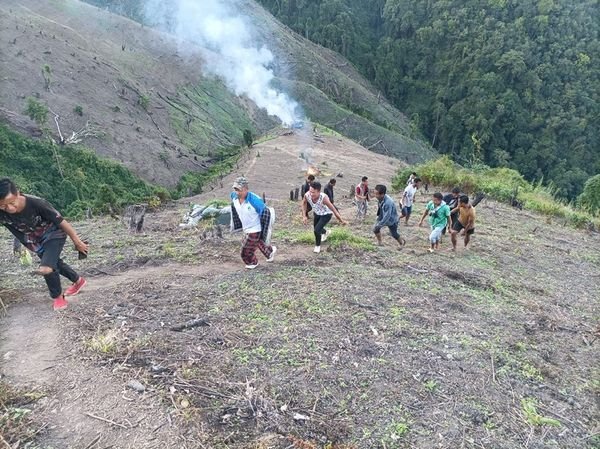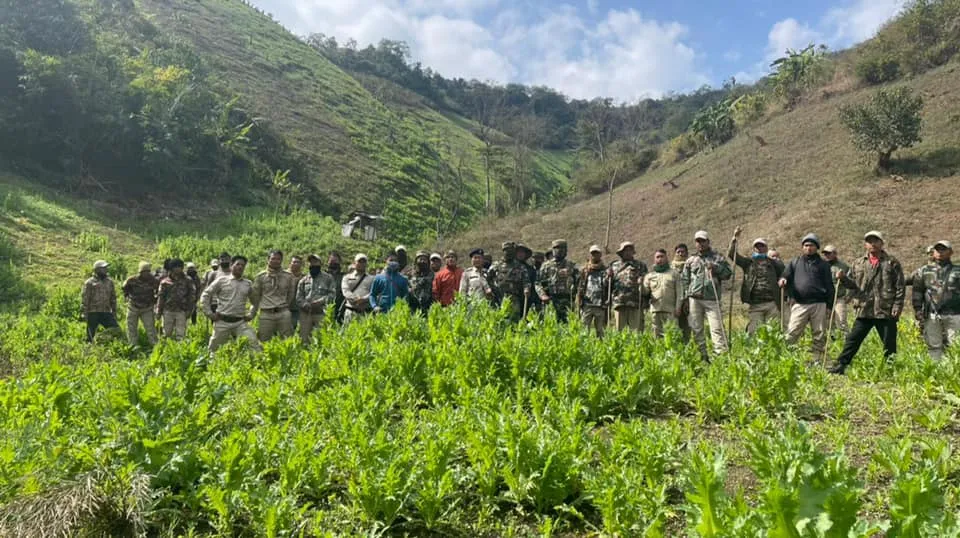Recently, Manipur CM N Biren announced that village chiefs and secretaries who were found involved in poppy plantations will be given life imprisonment. He also declared war against poppy cultivators, regardless of whether they are armed or not.
Ever since the BJP government came to Manipur in 2017, Biren is taking seriously in curbing the drug menace which is slowly destroying the future of the State. He was successful in mobilizing the first War on Drugs in the State. The second term also came up with more stringent laws to fight drug smugglers and poppy cultivators.

Several CSO, village chiefs, and individuals have come forward to support the clarion call of the CM on the War on Drugs. The government has been providing incentives to the farmers who used to cultivate poppies before. Specific funds have been sanctioned through the Horticultural Departments and other agencies to find alternate means of livelihood.
However, despite so much effort from the government, some people have not stopped poppy cultivation in the hills of Manipur. Recently, CM is furious over the image of denuded hills in the Kangpokpi districts which have been completely destroyed by poppy cultivators.
CM later decided that there will be War against poppy cultivators. It may be mentioned that in a video clip uploaded on social media, CM Biren was visibly upset and expressed his anger on finding that poppy was widely cultivated in the said area.
N Biren said, “My last warning to all the barbaric human beings involved in poppy plantations and drugs.”
Adding oil to the fire, two village heads, who were picked up for taking statements in connection with widespread poppy cultivation at Selsi village in Kangpokpi district, Manipur, escaped from Kangpokpi Police Station. Following it, the officer in charge, a sub-inspector, and two VDF personnel have been suspended from their duties.
Selsi village secretary and vice chairman were picked up for taking statements by summoning them after it was discovered that poppy was being widely cultivated amid green pea farms at Selsi village in Kangpokpi district.
Biren also posted on his official Facebook page about Manipur Police DG destroying the poppy in the hills.
Following Biren’s strong instructions against poppy cultivators, the village chairman, vice chairman, village secretary, and members were summoned to Kangpokpi Police Station.
Poppy cultivation, which refers to the cultivation of opium poppies, has negative impacts on the environment in the hills where it is grown. Several alternate livelihood schemes have been provided to these hills of Manipur.
One effective way to curb poppy cultivation is to provide poppy cultivators with alternative livelihood options that are more sustainable and less harmful to the environment. This could include training in new crops or livestock production, or providing access to micro-loans and other forms of support to help farmers transition to new livelihoods.
Increasing awareness about the negative impacts of poppy cultivation can also help to curb the practice. This could include educational campaigns targeted at farmers, as well as efforts to raise awareness among the general public about the harm caused by poppy cultivation.
One way in which poppy plantations can harm the environment is by replacing native vegetation with monoculture crops. This can lead to soil erosion and degradation, as well as the loss of habitat for native flora and fauna. Poppy plants also require large amounts of water, which can put a strain on local water resources and lead to water scarcity in the region.
Key highlights of the government’s war against poppy cultivators
There are a number of steps that governments may take to address the issue of illegal poppy cultivation in the hills of Manipur.
Implement law enforcement efforts to disrupt and dismantle drug trafficking organizations that may be involved in the cultivation and distribution of illegal drugs. This can involve activities such as investigations, arrests, and seizures of illegal drugs and assets.
Implement programs to educate and inform poppy cultivators about the risks and consequences of cultivating illegal crops such as opium poppies. This may include providing information on alternative livelihood options and the potential consequences of being caught cultivating illegal crops.
Work with local communities and organizations to develop and implement programs to support farmers in transitioning to alternative crops and livelihoods. This may include providing technical assistance, training, and financial support to help farmers switch to legal crops.
Implement development programs and initiatives in areas where illegal poppy cultivation is prevalent, with the goal of improving living standards and providing alternative sources of income for farmers. This may include investments in infrastructure, education, and economic development.
A more holistic and long-term approach that addresses the underlying economic and social drivers of illegal poppy cultivation is likely to be more effective in reducing this activity over the long term. The mission is to drug-free Manipur for a strong future.

